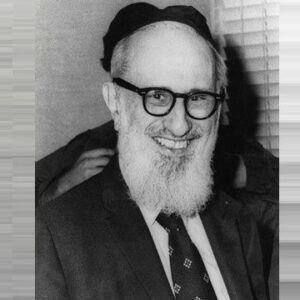Major American Orthodox rabbi and Modern Jewish philosopher Joseph B. Soloveitchik was a Jew. He was the beloved Talmudic scholar and religious figure of many Modern Orthodox Jews, serving as their counselor, mentor, and role model. He was destined to be the ultimate leader from an early age and acquired both a formal secular education and a Jewish education because he was born into a rabbinical dynasty. He moved to Berlin after receiving his degree, where he also pursued a hard Talmud study regimen, and there he completed his doctoral studies. Then, after arriving in America, he established one of the nation’s earliest Hebrew day schools, which later supported co-education. He later succeeded his father as dean of Yeshiva University’s rabbinical school and held the position of president of Modern Orthodoxy in America. For the majority of the 20th century, he was a recognized rabbinic authority and the main figurehead of American Modern Orthodoxy. His theological writings, such as “Halakhic Man” and “Lonely Man of Faith,” which presented a complex religious anthropology, have had a significant impact. He became the spiritual head of Modern Orthodoxy in America and one of the greatest Jewish thinkers of the 20th century through public speeches, writings, and his policy decisions for the Modern Orthodox world.
Early Childhood & Life
Rabbi Moshe Soloveitchik and his wife, Rebbetzin Pesia, welcomed their son Joseph Ber Soloveitchik on February 27, 1903, in Pruzhany, then part of Russia. Ahron, Anne, Samuel, and Shulamith were his four siblings.
His ancestors belonged to a two-century-old rabbinical dynasty. He received an intellectual-moral tradition of discipline from his father, the head of the RIETS rabbinical school at Yeshiva University, while his mother introduced him to science and non-Jewish culture.
He acquired his education from private tutors, a Talmud Torah, and an elementary yeshiva. He received his diploma from the liberal arts Gymnasium in Dubno in 1922.
He enrolled in the Free Polish University in Warsaw in 1924 and pursued a three-term political science degree there.
He also developed a strong devotion to Rabbi Hayyim Heller during his time in Berlin, who founded a center for advanced Jewish studies in the city from an Orthodox viewpoint.
With his doctoral thesis on the epistemology and metaphysics of the German philosopher Hermann Cohen, he earned his Ph.D. in December 1932.
Career of Joseph B. Soloveitchik
Joseph B. Soloveitchik joined traditional groups at the start of his career, including Agudath Israel of America and the Union of Orthodox Rabbis of North America. But as his understanding of Modern Orthodoxy deepened, he joined organizations like the Mizrachi Religious Zionists of America (RZA) and the moderate Orthodox Rabbinical Council of America (RCA).
One of the first Hebrew day schools in Boston was the Maimonides School, which he established in 1937. A high school was also founded in the late 1940s, and there, he instituted a number of novelties, including teaching Talmud to boys and girls in the same class.
He succeeded his father in 1941 as dean of the Yeshiva University’s Rabbi Isaac Elchanan Theological Seminary (RIETS), where he trained a whole generation of Orthodox rabbis until 1986.
Throughout his lengthy career, he rose to prominence, first as the head of the Rabbinical Council of America and then as an increasingly well-known public figure in American Orthodoxy. He was also the Religious Zionists of America’s honorary president (Mizrachi).
Nearly 2,000 rabbis who served in Orthodox synagogues in America and promoted Orthodox Jewish practice were ordained by him during the course of his extended career.
Bigger Works of Joseph B. Soloveitchik
Numerous essays and books by Joseph B. Soloveitchik provide a distinctive combination of Neo-Kantian existentialism and Jewish thinking. One of his best works is thought to be his book “The Lonely Man of Faith,” which addresses topics like the willingness to stand by oneself in the face of enormous hardships.
He steadfastly protected the rabbinate’s authority, fought against unjustifiable halakhic reform, and disapproved of theological discussion with the Church as well as with Reform and Conservative rabbis.
Personal Legacy & Life
Tonya Lewit, who holds a Ph.D. in education from Jena University, wed Joseph B. Soloveitchik in 1931. Together, Atarah and Tovah, two daughters, and Rabbi Dr. Haym Soloveitchik, a son, produced three children:
In his later years, he developed Alzheimer’s disease after first battling Parkinson’s disease.
At the age of 90, he passed away in Boston, Massachusetts, on April 9, 1993. In the Beth El Cemetery of the Baker Street Jewish Cemeteries in Massachusetts, he was buried next to his cherished wife.
Joseph B. Soloveitchik Net Worth
One of the wealthiest religious leaders and one of the most well-liked religious leaders is Joseph. According to our research, Joseph B. Soloveitchik has a net worth of $5 million, as reported by Forbes, Wikipedia, and Business Insider.


